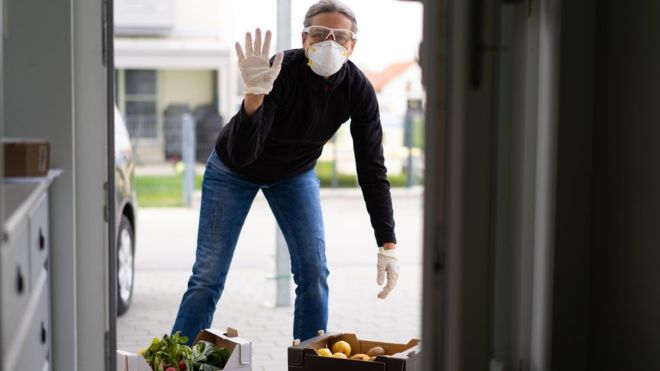 Strengthening protection for people shielding, while easing restrictions for everyone else, is the only immediate way to safely lift the UK's coronavirus lockdown, researchers say.
Strengthening protection for people shielding, while easing restrictions for everyone else, is the only immediate way to safely lift the UK's coronavirus lockdown, researchers say.
Strengthening protection for people shielding, while easing restrictions for everyone else, is the only immediate way to safely lift the UK's coronavirus lockdown, researchers say.
They say people could be sorted into three groups by risk - the most vulnerable, those caring for or living with them and everyone else.
It is not pain-free or perfect, they say, but could lift curbs for many yet still protect the NHS and save lives.
Their unpublished work uses modelling.
Scientists use modelling to study and compare likely outcomes of different scenarios - in this case, how to reverse the lockdown without causing a huge surge in coronavirus infections and deaths, the "second peak" experts fear if restrictions are lifted too fast or too soon.
The study does not detail which exact measures should be lifted and when, and assumes there would still be some social-distancing strategies - including the 2m (6ft) rule - in place for everyone throughout.
Their findings, which are being submitted for peer review and publication in a scientific journal, have been made available to the UK and Scottish governments, the authors say.
Currently, everyone in the UK is being asked to stay at home and to go outside for only essential shopping, medical needs or exercise. They can also travel to and from work if absolutely necessary.
In addition, those at the highest risk of serious health complications if they catch coronavirus - at least 1.6 million people in the UK - are being asked to shield.
This means not leaving their house at all and strictly avoiding any face-to-face contact with other people who may be carrying the virus.
This shielding was not included in the original mathematical models the government used to inform policy in the UK.
But this new study, by academics from the Universities of Edinburgh and London, looks at what might happen during the next phase of the coronavirus outbreak if shielding could be strengthened while some other measures are relaxed.
They say:
Then, people outside of these groups would be able to come out of full lockdown, as long as they:
But even if only about 60% of the UK's population was allowed to exit the lockdown, it would still be vital to keep transmission rates as low as possible through testing and contact tracing for people who might be infectious.
Co-author Prof Mark Woolhouse from the University of Edinburgh, who is also on the government's Scientific Advisory Group for Emergencies, described current lockdown rules as "strict" and said the research modelling suggested there was "wiggle room" for easing restrictions.
"By targeting protection to those that need it most, the strategy helps to ensure that the health system is not overwhelmed by severe cases, while giving policymakers greater leeway to partially relax social-distancing measures for the majority of the population."
The government is currently reviewing its lockdown policy and is expected to give an update on Sunday.
Asked whether people over 70 would be treated as a single group when lockdown restrictions are eased, Health Secretary Matt Hancock has said: "I can assure people that the shielding measures, which are going to have to go on for some time, they are not blanket measures and they do not apply to all over-70s."
By BBc News Health